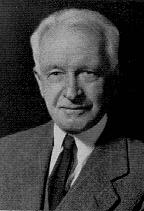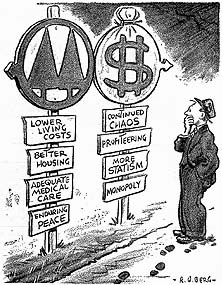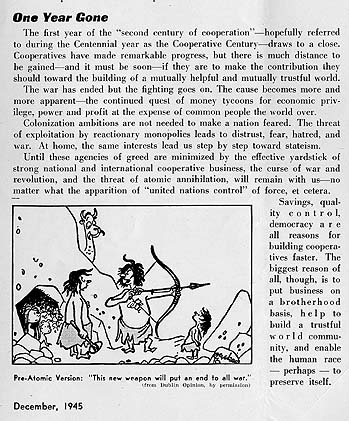
COOPERATIVE
PEACE
by James Peter Warbasse
Copyright 1950
by Cooperative Publishing
Association
|
CONSUMER
OWNERSHIP
Key to keeping a
FREE economy!

see also: CO-OP
Periodicals
from 1921-47
Learn about the attacks by NTEA,
the National Tax Equality Association. |
PREFACE
CONTENTS
This book is made necessary by the change now in process from
the economic system of profit capitalism to some other form. The
chaotic uncertainties which characterize the period are
associated with war and threats of war. A struggle between two
ideologies exists. One is for free private enterprise; the other
is for centralized governmental control of property and of men.
The cooperative way, presented here, exemplifies free private
enterprise and private ownership of property.
A purpose of this book is to show the cooperative method in
action as a way to rectify these conflicts, and therefore as a
way to peace.
It is an interesting fact that many books are written which
exhibit no knowledge of the cooperative movement but which
advocate cooperation as a way to peace and to the solution of
world problems. They are by social reformers and philosophers,
apparently unaware that the people are doing the very things
these authors advocate. In the humdrum world, events are taking
place which are not seen by eyes fixed on the skies.
The cooperative method here discussed is neither new nor
theoretical. It is an old and tested way of business. At this
juncture of history it needs to be understood for its
peace-promoting power. The main purpose of this book is to show
how the cooperative way not only makes for world peace but is
necessary for peace.
The various forms of cooperation are now testing themselves in
the world laboratory of change. They all serve a purpose. The
fact that this book deals with cooperation from the consumer
standpoint does not reflect upon the value and importance of
producer and marketing cooperatives. They are performing
essential services. The same can be said of profit business in
general which in the absence of any better way is making it
possible for consumers to get the things they need and for labor
to have employment.
The solution of the war problem has now become an immediate
and imperative necessity. It is not enough to say that we owe it
to our children and to future generations to prevent war. We owe
it to ourselves.
Sentimentality, moral appeal, disarmament conferences, peace
pacts, and exhibition of horrors of war have contributed little
to the cause of peace. This book examines certain salutary
economic tendencies in the consumer cooperative movement which
are actually in operation in all countries and across
international borders. In these are seen developing before our
eyes the conditions essential to peace. Peace is discovered
actually in the making. While this expansion of democracy in the
economic field is slow, nevertheless that very slowness may make
it substantial. Of all the ways that are looked to as leading
toward peace, the slow way in the end may be the quick way.
Expansion of the cooperative method makes for lessening the
need for political government. Instead of solving problems by
more political government, this book insists that less political
government is not only to be desired but is possible.
The time has come to plan for rehabilitation of the world, not
by returning to political and economic methods that have gotten
it into its troubles, but by using proved methods which make for
peace. These methods are applicable to all people and to all
economic needs. Already one-fourth the population of the world
are having experience in cooperative economy. The world should be
ready to renounce its old ways. The time is ripe for a new life
of abundance, peace, and justice.
War is here discussed from the broad social viewpoint. War
evidences an uncivilized condition of society. Whatever advances
the state of civilization makes for peace as against war. Not
everything in this book deals with the clash of arms. Much that
is said is far from the field of battle. But everything that is
discussed has to do with the bettering of world civilization.
This means more intelligent understanding of the nature of war
and peace. The way to peace is the deliberate way--through the
broad avenues of knowledge, education, social justice, and
ethical culture. The cooperative way is not approached as an
immediate way to stop war, or even to prevent war. It is
discussed as a way to a better state of culture and of human
relations--and that is the way to peace.
The author is aware that many other factors besides
cooperation have to do with peace. Peace depends upon something
more than economic conditions. Human psychology is a powerful
influence. For example, the decay of the home as a focus around
which the family life develops has much to do with the unrest
that disturbs peace. The neuroses are causes of war. The home is
now reducing itself to a place where people sleep, cohabit,
listen to the radio, and live between times. The home was once
the place where things were done, children born, clothing made,
food prepared, and industry carried on. First the father, then
the mother, found occupation elsewhere outside the home. The
withdrawal of women's interest from this center has deeply
affected the children. The lessening of wholesome parental
intimacy with children has resulted in the frustrations,
uncertainties and shocks which later show in the neuroses. The
increase of psychoneurosis gives rise to the instabilities,
antagonisms, and hatreds that disturb peace and make for war. But
whatever other factors are considered as causes of war, it will
be found that the cooperative method, as a way of life, decreases
their dangers. Thus while this book can not discuss all factors
contributing to peace, it must be borne in mind that cooperation
is a universal agent giving strength to all the ways of peace and
offering resistance to the ways of war.
Some of the material presented here is taken from other books
by the author, especially from his "Cooperation a Way of
Peace" (Harper and Brothers), "Cooperative
Democracy" (Harper and Brothers), and "The Cooperative
Way" (Barnes and Noble). This is because he desires to bring
to bear all available material upon this subject.
It might seem that this book represents cooperative
propaganda. This is correct; but the propaganda represents
education, and the bias is frankly for the cooperative way of
life. That, it can be shown, is a good way of life. Accordingly,
propaganda in favor of democracy, justice, mutual aid, abundance,
and happiness will be found in these pages.
The people in general want peace. Must they remain eternally
at the mercy of forces which are beyond their control? Must they
see wars made against their will and against their interests? Is
war a concern wholly of their political leaders? Is there
anything practical in the everyday life, to which the most humble
can lay his hands, that ultimately will help toward elimination
of war?
It is to these questions this book is addressed. In seeking
the answer the author turns to the actual affairs of the economic
and political life of the people.
The nature of this book is optimistic. It is not so much an
analysis of cooperation as it is an indication of the
comprehensive possibilities of the cooperative method as a way to
peace. Beyond this optimism are difficulties and an adverse side
which are discussed in the author's "Problems
of Cooperation," but not here. The author is aware of
the efforts of monopolistic profit business to hamper and destroy
the cooperative method of business, for the tendency of
cooperation is to keep down prices and to curtail profits. The
oil monopolies, for example, have on foot measures which are
shutting out the organized consumers from the production of
petroleum products for their own use. These great combines
apparently are not aware that in so doing they are creating
public disapproval and are moving ever closer to government
control and to government ownership of their very own industries.
The enemies of cooperation are the most potent business forces in
the world. Their activities may soon result in the political
socialization of all industry, which will leave cooperation in
the difficult position of competing with government in business.
The advancing wave of socialism may blot out cooperation and
delay its resurgence a thousand years. These questions are not
resolved in these pages.
The author acknowledges his indebtedness to Julia Nightingale
Perkins and to Dorothy Bourne Eldredge for valuable criticism and
for careful proofreading, for which he here expresses his
appreciation.
Gladheim
Woods Hole, Massachusetts
15 June, 1950
J. P. W.
COOPERATIVE METHODS
_1. Democratic control--One vote for each member.
_2. Limited rewards to capital--Capital, if it receive
returns, to have a fixed percentage which shall be not
more than the prevalent legal interest rate.
_3. Savings returns--Surplus saving, accruing from the
difference between net cost and the distribution price of
commodities and services, shall be returned to the
patrons as savings returns in proportion to their
patronage or used for beneficent social purposes.
_4. Unlimited membership.
_5. Voluntary affiliation.
_6. Business done for cash.
_7. Allocation of a certain percentage of surplus savings
for cooperative education.
_8. Class, political, and religious neutrality.
_9. Expansion into other fields of service as proficiency
is attained.
10. Federation of cooperative societies toward
international alliance.

CONTENTS
HOME



